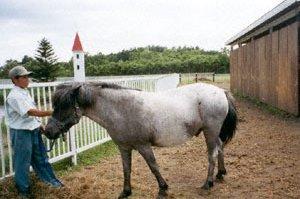
The Hokkaido horse is considered a descendant of the Nanbu horse, a breed which is thought to have been bred in Tohoku, the northern region of Honshu. However the Nanbu breed no longer exists and definitive information on its history is absent. This is because the Nanbu horse was historically renowned as a military horse and was heavily crossbred during the late 19th century to develop a larger breed suitable for modern military. Obviously the horses brought to Hokkaido by fishermen earlier were ones thought to be inferior among the Nanbu breed because the fishermen did not intend to bring the horses back with them from the first place.
Most of this breed is found on the Pacific coast of Hokkaido. They are the most plentiful of the remaining ancient Japanese ponies, numbering at 2000 head. Hokkaido horses are used for heavy transportation in the mountains where trucks and other equipment cannot go. They are very strong for their size and have a willing temperament. They are also used as pleasure mounts.
Some ranchers in Hokkaido still winter the horses in the mountains, continuing the breeds survival traits. They feed mainly on bamboo grass and wander around in the mountains in search of it. In spring they returned to the ranches without assistance as during this time the bears awaken from hibernation in the mountains and start to prey on the foals.
As in other Japanese breeds, the Hokkaido is found in most solid colors, and many are roan. White markings of any kind are rare and not allowed for registration. They stand 13 to 13.2 h.h.
Population Status: Rare